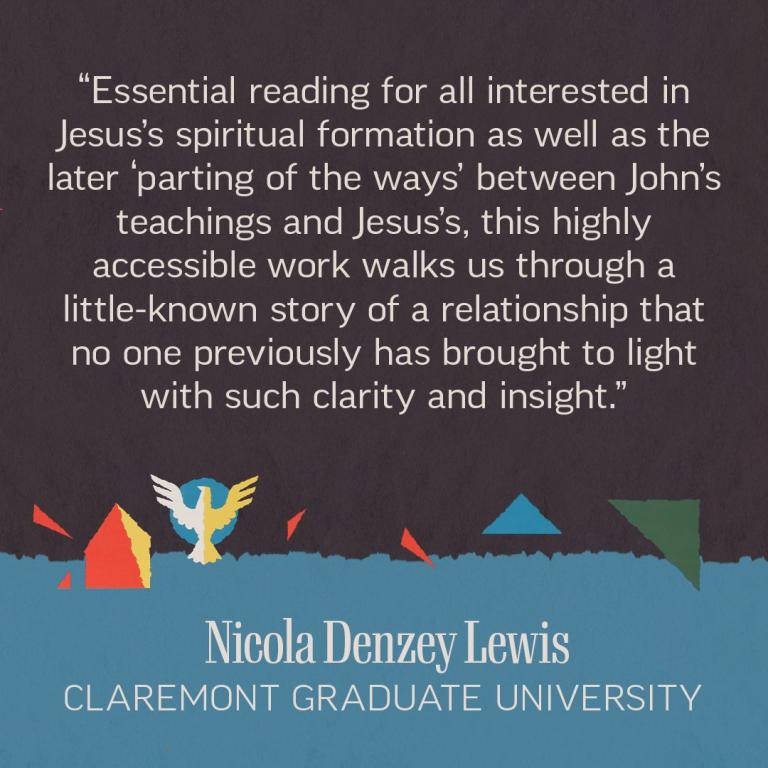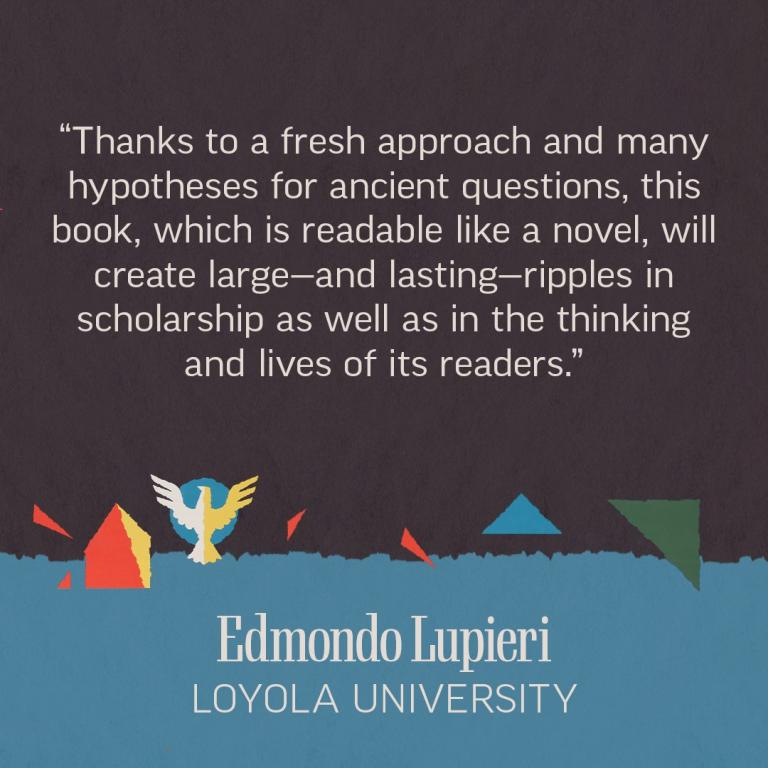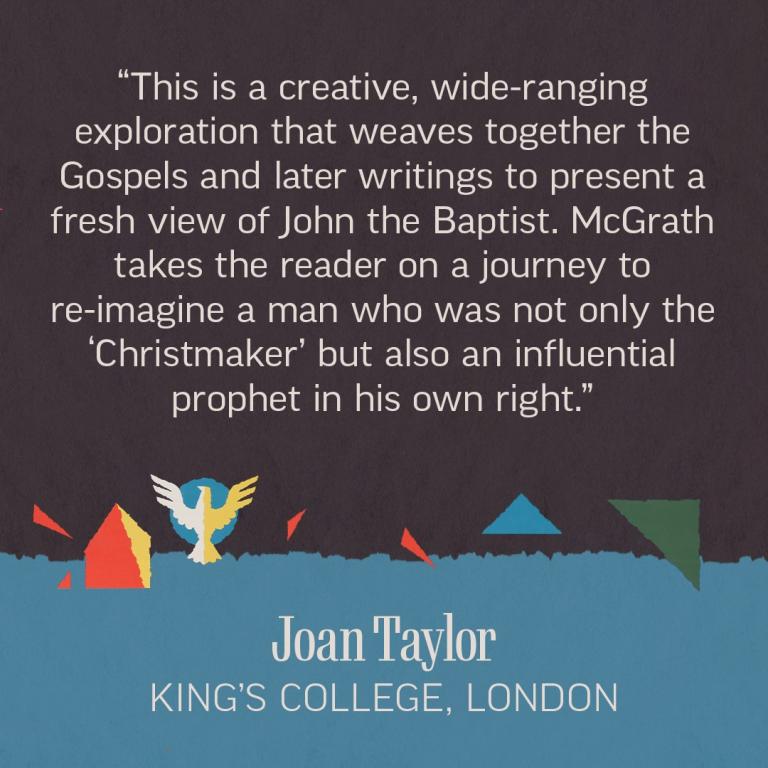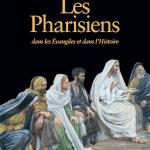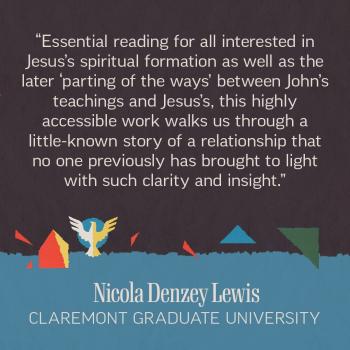I am humbled and honored by the endorsements of Christmaker: A Life of John the Baptist.
“Essential reading for all interested in Jesus’s spiritual formation as well as the later ‘parting of the ways’ between John’s teachings and Jesus’s, this highly accessible work walks us through a little-known story of a relationship that no one previously has brought to light with such clarity and insight.”
—Nicola Denzey Lewis, Claremont Graduate University
“Thanks to a fresh approach and many hypotheses for ancient questions, this book, which is readable like a novel, will create large—and lasting—ripples in scholarship as well as in the thinking and lives of its readers.”
—Edmondo Lupieri, Loyola University“This is a creative, wide-ranging exploration that weaves together the Gospels and later writings to present a fresh view of John the Baptist. McGrath takes the reader on a journey to re-imagine a man who was not only the ‘Christmaker’ but also an influential prophet in his own right.”
—Joan Taylor, professor of Christian origins and Second Temple Judaism, King’s College, London
There are a number of points at which my conclusions and my portrait differ from those of others. One point I try to emphasize is that we have no evidence for “conversion baptism” in Judaism prior to John, and that when we first encounter it the reference is to the first Jewish purity immersion the Gentile convert undergoes. Positing this as background for John’s baptism therefore will not work. On the one hand the ritual has had additional meaning read into it by Christian interpreters who view it through the lens of Christian baptism. On the other hand, to the extent that it came to be seen as more significant we should see the influence of John’s baptism on Jewish proselyte baptism rather than vice versa.
For a moment recently I thought I might have missed something important. The Cultural Backgrounds Study Bible mentioned Epictetus as providing evidence for Jewish proselyte baptism in this time. Here is the relevant section from his Discourses Book 2:
For what is the difference between explaining these doctrines and those of men who have different opinions? Sit down now and explain according to the rules of art the opinions of Epicurus, and perhaps you will explain his opinions in a more useful manner than Epicurus himself. Why then do you call yourself a Stoic? Why do you deceive the many? Why do you act the part of a Jew, when you are a Greek? Do you not see how (why) each is called a Jew, or a Syrian or an Egyptian? and when we see a man inclining to two sides, we are accustomed to say, This man is not a Jew, but he acts as one. But when he has assumed the affects of one who has been imbued with Jewish doctrine and has adopted that sect, then he is in fact and he is named a Jew. Thus we too being falsely imbued (baptized), are in name Jews, but in fact we are something else. Our affects (feelings) are inconsistent with our words; we are far from practising what we say, and that of which we are proud, as if we knew it. Thus being unable to fulfil even what the character of a man promises, we even add to it the profession of a philosopher, which is as heavy a burden, as if a man who is unable to bear ten pounds should attempt to raise the stone which Ajax lifted. (2.9)
A footnote by the translator suggests the following: “It is possible, as I have said, that by Jews Epictetus means Christians, for Christians and Jews are evidently confounded by some writers, as the first Christians were of the Jewish nation. In book iv. c. 7, Epictetus gives the name of Galilaeans to the Jews. The term Galilaeans points to the country of the great teacher. Paul says (Romans, ii. 28), ‘For he is not a Jew, which is one outwardly—but he is a Jew which is one inwardly,’ etc. His remarks (ii. 17–29) on the man ‘who is called a Jew, and rests in the law and makes his boast of God’ may be compared with what Epictetus says of a man who is called a philosopher, and does not practise that which he professes.”
This seems plausible, that Epictetus was referring to the spread of a Jewish philosophy that we would call Christianity. Even if he was aware of immersion as involved when Gentiles embraced Judaism, however, the statement would still not alter the fact that the first purity immersion of a Gentile, however symbolic and significant, was not the same thing as John’s baptism for the forgiveness of sins.
My larger book on John the Baptist, John of History, Baptist of Faith: The Quest for the Historical Immerser is also available for pre-order. I wonder whom Eerdmans will get to endorse it. I think the publicity copy they came up with captures the book’s significance well:
In the popular imagination, John the Baptist plays the supporting role of Jesus’s unkempt forerunner. But meticulous historical study reveals his wide-reaching and enduring influence on the history of religion.
The first study of its kind, John of History, Baptist of Faith sheds light on the historical John the Baptist and his world. James F. McGrath applies historical-critical methodology not only to the New Testament but also to the Mandaean Book of John, a holy text of the last extant gnostic sect. McGrath uses the teachings of John’s pupil, Jesus, as a window into his mentor’s beliefs. Along the way, he brings new clarity to questions of contention among scholars, such as John’s use of immersion as a substitute for temple sacrifice.
Bold in its claims yet careful in its methodology, John of History, Baptist of Faith lends fresh insight into John, Jesus, and their world. McGrath’s pioneering monograph will challenge and intrigue students and scholars of the New Testament and Second Temple Judaism.
You can already read the very beginning of the introduction of Christmaker: A Life of John the Baptist on Amazon. I have also written the foreword for Al Streett’s forthcoming book, Exploring the Paranormal. Christianbook still has the best price for The A to Z of the New Testament.
